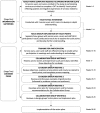The CORE study protocol: a stepped wedge cluster randomised controlled trial to test a co-design technique to optimise psychosocial recovery outcomes for people affected by mental illness in the community mental health setting
- PMID: 25805530
- PMCID: PMC4386225
- DOI: 10.1136/bmjopen-2014-006688
The CORE study protocol: a stepped wedge cluster randomised controlled trial to test a co-design technique to optimise psychosocial recovery outcomes for people affected by mental illness in the community mental health setting
Erratum in
-
Correction.BMJ Open. 2015 Jul 14;5(7):e006688corr1. doi: 10.1136/bmjopen-2014-006688corr1. BMJ Open. 2015. PMID: 26173713 Free PMC article. No abstract available.
Abstract
Introduction: User engagement in mental health service design is heralded as integral to health systems quality and performance, but does engagement improve health outcomes? This article describes the CORE study protocol, a novel stepped wedge cluster randomised controlled trial (SWCRCT) to improve psychosocial recovery outcomes for people with severe mental illness.
Methods: An SWCRCT with a nested process evaluation will be conducted over nearly 4 years in Victoria, Australia. 11 teams from four mental health service providers will be randomly allocated to one of three dates 9 months apart to start the intervention. The intervention, a modified version of Mental Health Experience Co-Design (MH ECO), will be delivered to 30 service users, 30 carers and 10 staff in each cluster. Outcome data will be collected at baseline (6 months) and at completion of each intervention wave. The primary outcome is improvement in recovery score using the 24-item Revised Recovery Assessment Scale for service users. Secondary outcomes are improvements to user and carer mental health and well-being using the shortened 8-item version of the WHOQOL Quality of Life scale (EUROHIS), changes to staff attitudes using the 19-item Staff Attitudes to Recovery Scale and recovery orientation of services using the 36-item Recovery Self Assessment Scale (provider version). Intervention and usual care periods will be compared using a linear mixed effects model for continuous outcomes and a generalised linear mixed effects model for binary outcomes. Participants will be analysed in the group that the cluster was assigned to at each time point.
Ethics and dissemination: The University of Melbourne, Human Research Ethics Committee (1340299.3) and the Federal and State Departments of Health Committees (Project 20/2014) granted ethics approval. Baseline data results will be reported in 2015 and outcomes data in 2017.
Trial registration number: Australian and New Zealand Clinical Trials Registry ACTRN12614000457640.
Keywords: PRIMARY CARE; PSYCHIATRY.
Published by the BMJ Publishing Group Limited. For permission to use (where not already granted under a licence) please go to http://group.bmj.com/group/rights-licensing/permissions.
Figures
References
-
- Bate P, Robert G. Bringing user experience to healthcare improvement: the concepts, methods and practices of experience-based design. Oxford: Radcliffe, 2007:224.
-
- Robert G. Participatory action research: using experience-based co-design to improve the quality of healthcare services. In: Ziebland S, Coulter A, Calabrese JD, Locock L eds. Understanding and using health experiences: improving patient care. Oxford: Oxford University Press, 2013.
Publication types
MeSH terms
Associated data
LinkOut - more resources
Full Text Sources
Other Literature Sources
Medical


